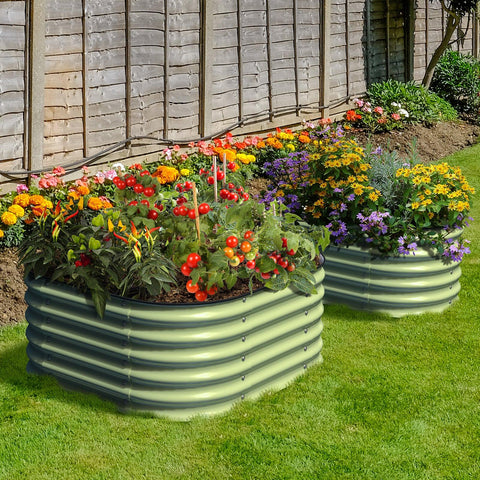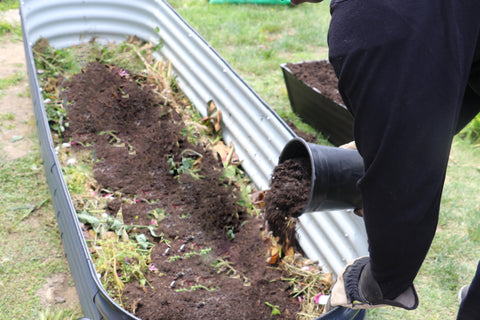Tips from Olle Garden Bed: How to Compost Chicken Manure and Use It In the Garden
Raising chickens on your homestead gives you more than just eggs (and potentially meat).Chickens also use scratching to help integrate organics. They eat pests, or they will disturb your property. Of course, they "recycle" nutrients and provide feces to fertilize your garden. The following content also has some reference value for raised garden beds.
Chicken manure is a valuable soil conditioner suitable for your planting area.
If you raise a flock of chickens, your chicken manure is a valuable and free resource. However, using chicken manure in the garden is not simply throwing fresh manure on the soil. It is important to understand the characteristics of feces and to age or compost them before use.
If you don't raise chickens in your garden, you will miss it! But you can still enrich your garden with chicken manure in granular form.

Whether you use it as a by-product of poultry or buy it, using chicken manure in the right way can bring great benefits to your garden.
Characteristics of chicken manure
Chicken manure is an excellent source of nitrogen, which is one of the three main nutrients necessary for plant growth. It also contains moderate amounts of phosphorus and potassium, as well as small amounts of other plant nutrients - such as calcium.
When we talk about how good manure or other soil amendments are as fertilizers, we tend to use a ratio called NPK. This gives the percentage of nitrogen, phosphorus and potassium content of the material.
The NPK value of fresh chicken manure varies greatly, because a large part of it depends on the diet and feeding conditions of animals.
It also depends on how long it has rotted or composted before use. (Chicken manure must be composted before use, which will be discussed later in this article.
Generally, the NPK ratio of chicken manure is not as high as that of synthetic fertilizer. (Although they are higher than the feces of horses, cattle or other livestock, synthetic nitrogen fertilizer has caused great damage to the environment - both in manufacturing and use.
Chicken manure (if used properly) can add important nutrients. Unlike synthetic fertilizers, it can also help your garden in other ways.
Adding well aged chicken manure to your garden can not only improve its fertility, but also improve the soil structure. It is an organic substance that can improve the drainage of heavy clay and help the soil to drain freely by improving its water retention.
The use of chicken manure can also promote a healthy population of soil biota to maintain the proper function of the soil web.
Chicken manure granules
You can also buy commercial chicken manure in dry and granular form.
Chicken manure granules are a very useful nitrogen rich fertilizer. Their NPK values are usually 4-2-1. (4% ammonia nitrogen, 2% phosphorus pentoxide and 1% potassium oxide).
However, although chicken manure particles can improve the fertility of the garden, it is important to realize that they will not change other soil properties of sheep manure raised on your homestead.
Why should you not use fresh chicken manure directly in the vegetable garden
Although chicken manure is very useful in the garden, it is not used directly. There are many reasons why it is not a good idea to spread feces directly around the edible garden.
First and foremost, like other feces, chicken manure may contain bacteria and other pathogens. Some of them, such as Salmonella, may pose a serious threat to human health.
It is very important to wear gloves when handling materials. If you do come into contact with it, wash your hands thoroughly to avoid contamination.
Pathogens that pose a risk to humans will not harm plants, but they can stay in the soil for a longer time and can infect you by entering or even entering the plants you plant.
Secondly, the nitrogen content of fresh chicken manure is high enough to "burn" plants or even kill them. If the roots of plants come into contact with materials with high nitrogen content, they may be damaged.
Finally, although it has fewer problems than the above, it has odor problems. Fresh chicken droppings can be quite pungent. It is definitely not something you want to be close to edible plants, nor is it in an area that you regularly care for.
Fortunately, composting chicken manure is very easy, so it is safe for people and plants, and can be spread around your planting area or used in your garden in other ways.

Compost chicken manure
Composting chicken manure requires heat or a lot of time.
The first and fastest way to compost chicken manure is to use a thermal composting system.
In a hot composting system, you heat chicken manure to at least 130 degrees Fahrenheit for at least 15 days. The higher temperatures in this system mean that materials decompose faster, and pathogens usually die at these higher temperatures. This greatly reduces the risk of pollution.
Interestingly, you can consider using the heat generated by decomposing feces. One idea is to create a hotbed for winter planting. (In the hot bed, chicken manure and straw/sawdust or other carbon rich materials are contained below the compost/topsoil area where seeds or plants can be placed.
You can also heat the water by running the pipes through the hot compost pile before running them to the growing area in the greenhouse. This is a way to heat the space. This means that in cold climates, more can be planted in winter.
Cold compost
Alternatively, you can use a typical cold compost heap or trash can. In this case, the speed of material decomposition is much slower. Faeces can only be safely used after a longer time.
It is best to compost for a year before using these materials in the garden.
The successful composting of chicken manure can also be achieved through the chicken house or the deep bedding bed in running. This is basically a form of in situ composting.
As with typical cold composting, deep bed bedding involves combining the correct proportions of carbon and nitrogen rich materials. Getting the right proportions allows them to successfully decompose. When the material is decomposed, add new bedding on it. After that, bedding and excrement are combined to make compost, which you can use in the garden.
The type of bedding used will determine the ratio of bedding to feces. However, due to the high nitrogen content of chicken manure, it is important to ensure that there are enough carbon rich materials (wood chips or shavings, cardboard, dry leaves, etc.). You may use a carbon nitrogen ratio of at least 1:1, or even 2:1 in some cases.
Use compost chicken manure in the garden
After composting chicken manure, you can use it just like any other compost in your garden.
In a dig free garden system, organic materials are scattered on the surface of the garden, rather than being cultivated or excavated into the topsoil.
The advantage of this is that the soil ecosystem is relatively undisturbed and the soil biota can continue to play its role. Scatter the material on the soil surface. Microbes and other life in the soil should do the rest for you - recover nutrients into the system and integrate the material into the soil.
Generally, the best time to use chicken manure in the garden is in spring and autumn. In spring, you can comb the top of the bed before sowing or planting. You can also use compost to make new garden beds, huge cultural mounds or other planting areas.
In autumn, you can also throw manure. Do this as soon as possible after removing nitrogen hungry crops and before sowing winter crops or green manure to protect winter soil.

Liquid chicken manure
Another way to use compost chicken manure is to make liquid fertilizer to provide faster promotion for nitrogen rich leafy crops in summer.
Made in the same way as any other composted tea - by mixing some compost with water. The cover or topdressing of chicken manure is a slow release fertilizer. Over time, nutrients are released and provided to plants. Liquid fertilizers work faster.
Which plants benefit from chicken manure fertilizer
The plants that will benefit from chicken manure are those that require large amounts of nitrogen. Generally speaking, the plants with the highest nitrogen demand are leafy plants, such as brassica (annual or perennial).
However, many plants will benefit from the nitrogen and other nutrients that feces can provide.
Do not add chicken manure to acid loving plants such as azalea, hydrangea or blueberry, because it usually has a slightly alkaline pH value.
It is also important to remember that chicken manure can enrich forest gardens or orchards without any intermediate steps.
When chickens are foraging and scratching under fruit trees and bushes, they will provide a small amount of fertilizer for free. This is particularly beneficial for perennial plants with high nitrogen demand, such as plum trees and blackcurrants.
